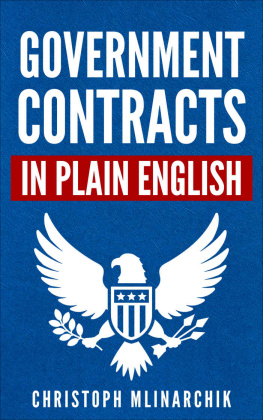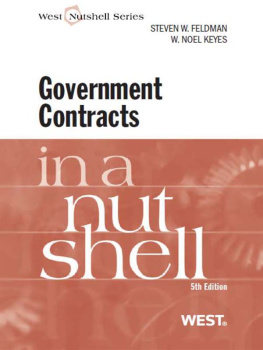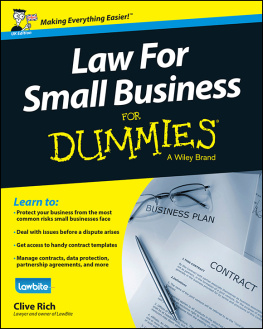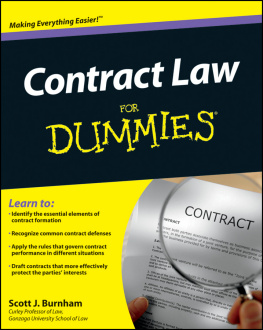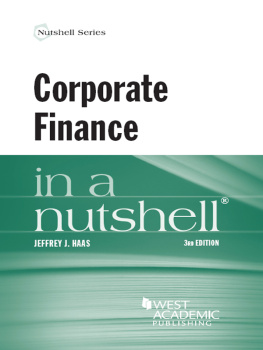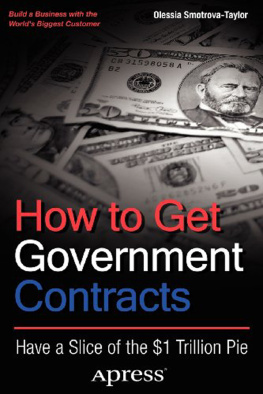Government Contracts
in Plain English
What Federal Contractors Need to Know About the FAR (Federal Acquisition Regulation), DFARS, Subcontracts, Small Business Set-Asides, GSA Schedules, Bid Protests, REA vs. Claim, Terminations for Convenience, and More
Christoph Mlinarchik
www.ChristophLLC.com
About the Author, Christoph Mlinarchik
Christoph LLC provides expert advice in government contracts: consulting, expert witness services, and professional training. Contact Christoph LLC for solutions or to receive free, monthly updates on government contracts:
Owner Christoph Mlinarchik, JD, CFCM, PMP (Certified Federal Contract Manager, Project Management Professional) is an attorney, expert witness, professional instructor, consultant, frequent public speaker, nationally recognized subject matter expert, and award-winning author of 75+ publications on government contracts and acquisitions. Christoph was honored with the Top Professionals Under 40 award by National Contract Management Association (NCMA). Christoph is an experienced expert witness who has provided expert opinions and reports, research concerning damages, key findings, and case strategy for complex contracts litigation.
Christophs consulting clients include IT, professional services, defense, cybersecurity, construction, medical/health care, intelligence, national security, research, science/technology, and several other sectors.
Christoph has taught or trained 1000+ federal, military, and contractor professionals nationwidefrom novices to C-level executives. Businesses and individuals rely on Christophs expertise to navigate the complexities of the federal contracting marketplace. Contracts managers, attorneys, chief executive officers, program managers, sales directors, business capture and proposal experts, and other contracts professionals consistently provide outstanding reviews for Christophs consulting expertise, teaching skills, presentation style, and client satisfaction.
Christoph has negotiated, reviewed, or managed billions of dollars of government contracts over the course of his career. This real-world experience provides an invaluable perspective for clients.
Copyright 2019
Christoph Mlinarchik
www.ChristophLLC.com
All rights reserved.
ISBN: 978-1-7341981-5-7
Table of Contents
Section 1, Critical Contracting Concepts
Chapters 1 14
Table of Contents
Section 2, How to Win Government Contracts
Chapters 15 26
Table of Contents
Section 3, Managing Your Government Contracts
Chapters 27 35
Chapter 1
Introduction to Government Contracts in Plain English
Government contracting can be complex and difficult, but this book makes it simple and easy for you.
My book is not a scholarly treatise with extensive citations and footnotes. I wrote this book for youthe busy professional who needs the bottom line up front (BLUF). In fact, you can turn to any chapter and read its bottom line up front in just a few seconds. The BLUF that starts each chapter is also the executive summary of the chapter. It should keep you focused and help you remember key points.
I started my company www.ChristophLLC.com years ago to offer expert advice on government contracting. My company delivers consulting advice to federal contractors and subcontractors, professional training, and expert witness services.
This book is written in plain English. Remember, it is not an expert witness report or a scholarly article.
An expert witness is under a microscope. My expert reports, testimony, and declarations are subjected to scrutiny by very determined opposing attorneys. They examine my every statement of fact and every expert opinion, along with every footnote and reference.
This book is different because it gives you the basics of government contracting in plain English. It simplifies many complex ideas into sound bites. This book is practical advice for the busy executive or other professional.
My clients love how I explain complicated things in a simple way. In fact, my streamlining is the primary reason why they hire me. They need an expert who can discover the important issues quickly and deliver a plan of action that solves their problem. Dont you want someone to make it simple for you? I use as little jargon or confusing words as possible with my clients. I provide details when appropriate, but I always give the bottom line up front or BLUF.
Whether Im teaching a class of 50 students or advising the CEO of a corporation, I provide real world, practical advice. This book delivers useful information from an experienced insider, but it cannot cover every topic or circumstance in government contracting.
You knew I would say this
This book is not legal advice, which should come from a licensed attorney. It is not tax advice, which should come from a competent tax professional. It is not accounting advice, which should come from a certified public accountant (CPA). This book is a practical overview in plain English of the most important topics in government contracting. If you have a specific problem, you need a specific answer from a competent professional. My email address is .
Why is government contracting different?
Government contracting offers (forgive the pun) FAR less freedom of contract than private sector contracting.
To grasp the difference, lets compare a contract with your imaginary company to a government contract. Your imaginary company is privately owned, and the best part is that you own 100% of the company. You have no duty to shareholders, and you have no co-owners or business partners.
If your company wants to funnel all its contracts to your close friends and relatives, who will object? Even if your friends supply company is overpriced, and your mothers services company is inefficient, maybe you can scrape by and survive.
Its entirely up to you, the owner, to decide what you want to do with your business. You can hand out contracts to whomever you choose, for almost any reasonwise or foolish, benevolent or evil. The seed money for your company came from your pocket; the company is your property.
Government contracts are funded with your taxpayer money
Government contracting is vastly different because federal agency money is taxpayer money. If you are an American citizen, its not the federal agencys money at allits yours! Using taxpayer money significantly constrains the government and the contractor. Many laws and regulations protect taxpayer interests and make government contracting more difficult.
Government contracts involve the largest client in history
The United States of America is the largest client in the history of man. Uncle Sam spends about a trillion dollars each year on government contracts and grants. That fact is the good part.
The bad part is the government has a tremendous advantage in government contracts. The laws, regulations, policies, and court decisions heavily favor the government. Some of the rules of government contract law are strikingly different from normal contract law. For example, the government can terminate your contract at any time for almost any reason. Your company will not be compensated for the loss of future revenue. The government can break its promises and contracts with your company with no significant repercussions to itself. Read more about the scariest clause in government contractingTermination for Conveniencein Chapter 4, Important Clauses in Government Contracts.
Government contracts are highly regulated
Government contracting occurs in a highly regulated environment. So many laws, regulations, policies, and court cases affect how taxpayer money can be spent, how federal agencies can choose contractors, and what special clauses government contracts must include. This legal complexity burdens your company with huge administrative and overhead costs. Regulation is a significant barrier to entry for new government contractors. Never underestimate the costs of compliance in government contracts.
Next page
